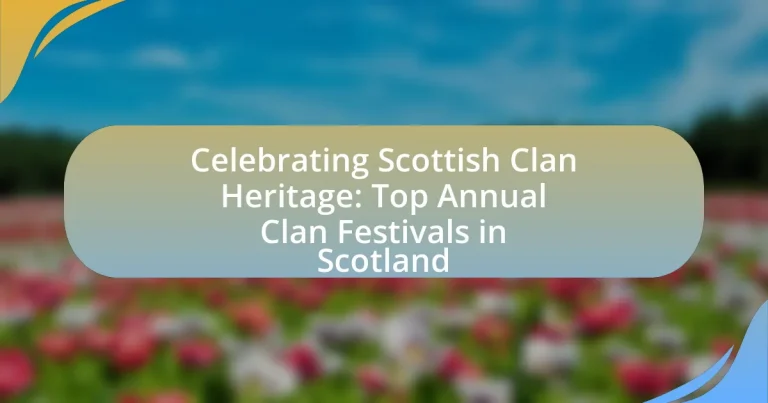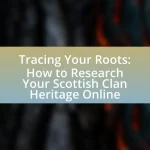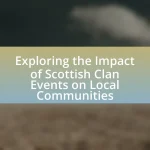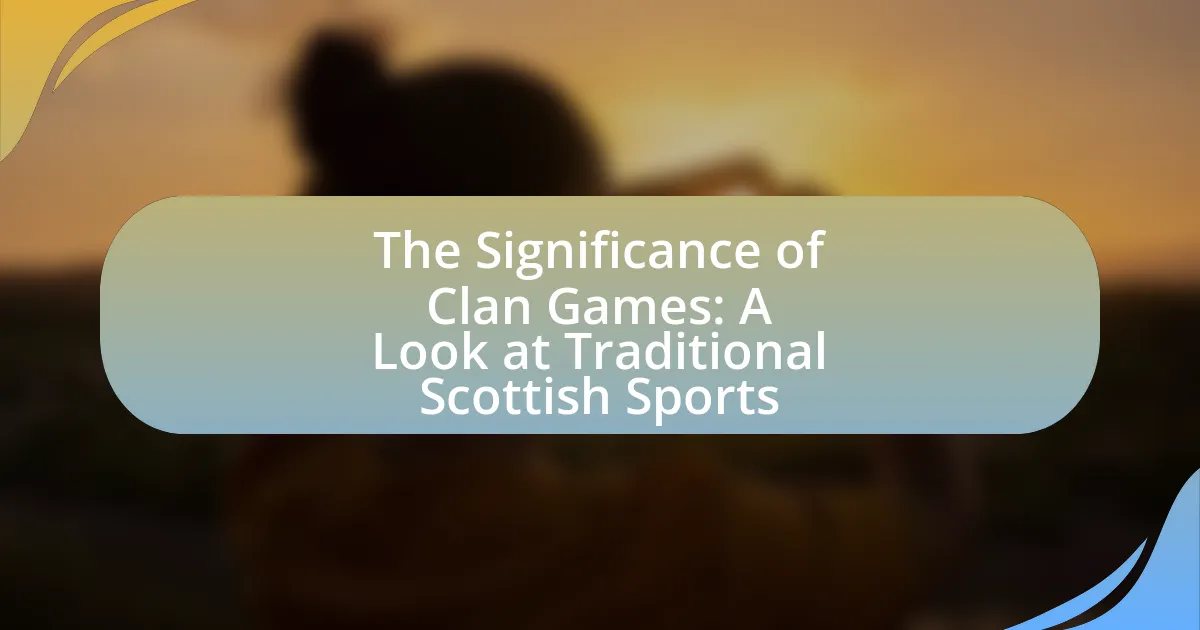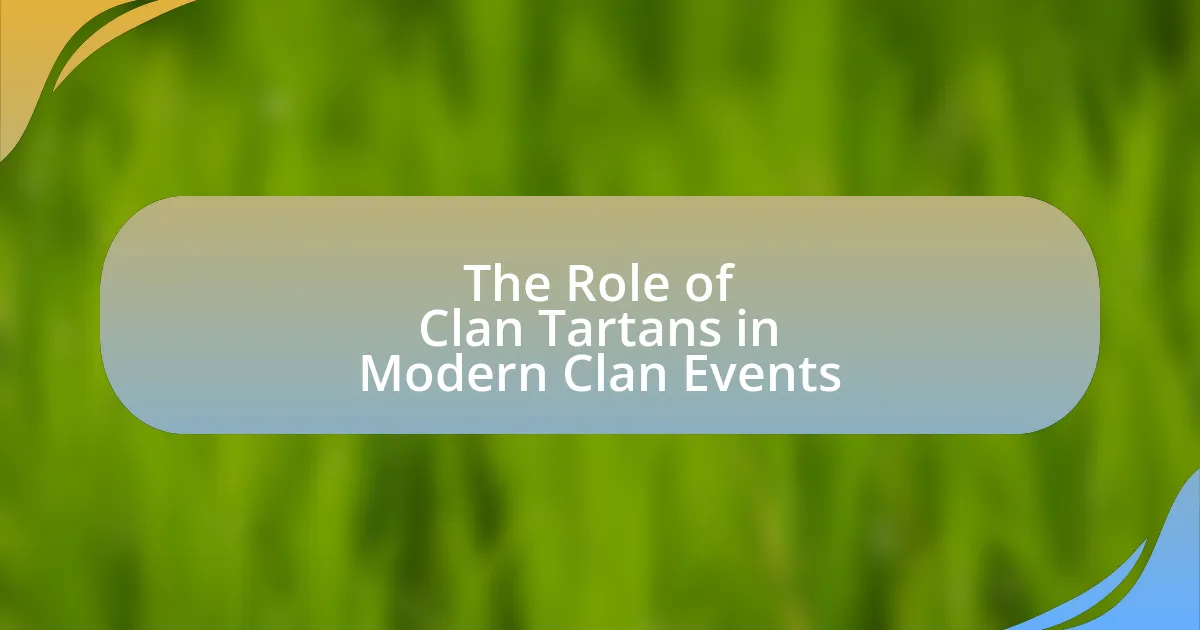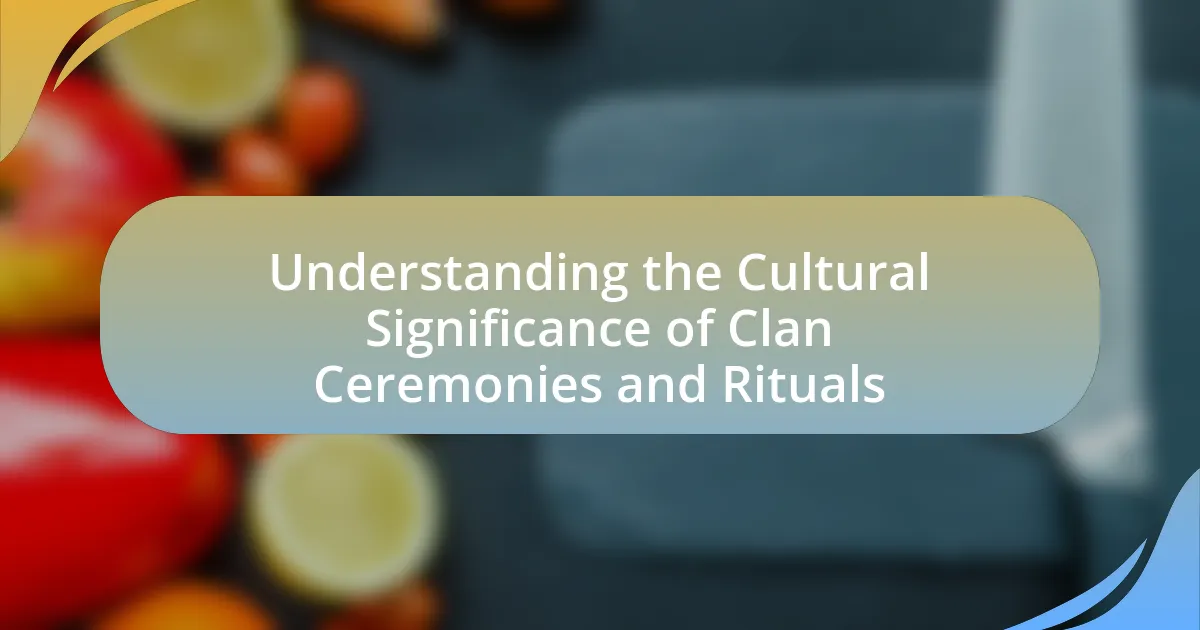Scottish Clan Festivals are cultural events that celebrate the heritage, traditions, and history of Scottish clans through activities such as traditional music, dance, food, and athletic competitions. These festivals, including notable gatherings like the Clan Gathering at Edinburgh Castle and the Braemar Gathering, foster community and clan identity while showcasing unique customs and historical reenactments. The article explores how these festivals promote cultural preservation, community bonding, and clan identity, detailing the various activities, competitions, and traditions that attendees can expect. Additionally, it highlights the significance of these events in maintaining Scottish culture and provides insights on how individuals can participate and prepare for these celebrations.
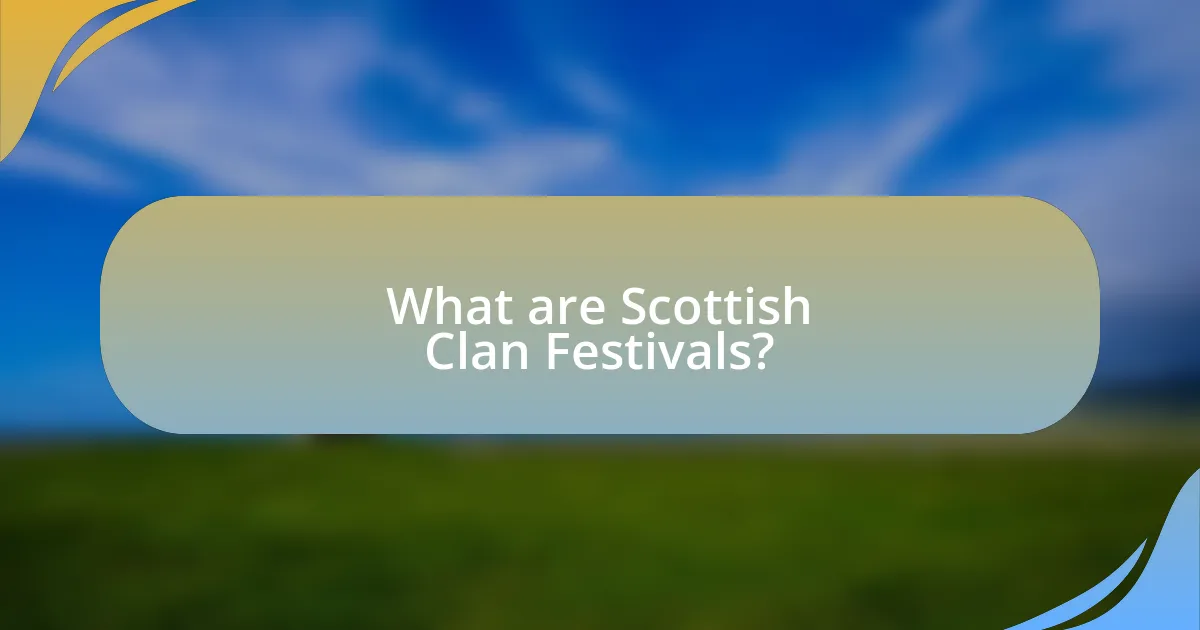
What are Scottish Clan Festivals?
Scottish Clan Festivals are cultural events that celebrate the heritage, traditions, and history of Scottish clans. These festivals typically feature activities such as traditional music, dance, food, and competitions, including athletic events like caber tossing and tug-of-war. They often serve as a gathering point for clan members and those interested in Scottish culture, fostering a sense of community and identity. Notable examples include the Clan Gathering at the Edinburgh Castle and the Braemar Gathering, which has historical significance dating back to 1832.
How do Scottish Clan Festivals celebrate heritage?
Scottish Clan Festivals celebrate heritage by showcasing traditional customs, music, dance, and historical reenactments that reflect the unique identities of various clans. These festivals often feature clan gatherings where members can connect, share stories, and participate in competitions such as tug-of-war and caber tossing, which are rooted in Scottish culture. Additionally, many festivals include displays of tartans, heraldry, and genealogy workshops, allowing attendees to explore their ancestral connections. For example, the Royal Edinburgh Military Tattoo highlights Scotland’s military heritage through performances that incorporate clan history and pride, reinforcing the cultural significance of these events.
What traditions are commonly featured at these festivals?
Common traditions featured at Scottish clan festivals include Highland games, clan gatherings, and traditional music and dance performances. Highland games showcase athletic competitions such as caber tossing and tug-of-war, reflecting Scotland’s cultural heritage. Clan gatherings often involve parades, where members display their tartans and banners, fostering a sense of community and identity. Additionally, traditional music and dance, including ceilidh dancing and bagpipe performances, are integral to the festivities, celebrating Scotland’s rich artistic traditions. These elements collectively reinforce the cultural significance of clan heritage in Scotland.
How do these festivals promote clan identity?
Clan festivals promote clan identity by providing a platform for members to gather, celebrate shared heritage, and reinforce cultural traditions. These events often feature traditional music, dance, and storytelling that highlight the unique history and values of the clan, fostering a sense of belonging among participants. For example, the Gathering of the Clans in Scotland attracts thousands of attendees who participate in activities that emphasize their ancestral ties, such as clan parades and competitions. This collective experience strengthens clan bonds and enhances the visibility of clan identity within the broader Scottish culture.
Why are clan festivals important to Scottish culture?
Clan festivals are important to Scottish culture because they serve as vital expressions of heritage, identity, and community among Scots. These festivals celebrate the history, traditions, and values of specific clans, fostering a sense of belonging and continuity. For instance, events like the Clan Gathering at Edinburgh Castle and the Braemar Gathering not only showcase traditional music, dance, and sports but also reinforce familial ties and cultural pride. Historically, clan festivals have been pivotal in preserving Scottish customs, as they provide a platform for storytelling and the transmission of clan histories, ensuring that these legacies are passed down through generations.
What role do clan festivals play in community bonding?
Clan festivals play a crucial role in community bonding by fostering a sense of identity and belonging among members of the clan. These events provide opportunities for individuals to connect with their heritage, share traditions, and strengthen familial ties. For instance, festivals often include activities such as traditional music, dance, and storytelling, which serve to reinforce cultural values and collective memory. Additionally, clan festivals facilitate social interactions, allowing members to meet, engage, and collaborate, thereby enhancing community cohesion. Historical evidence shows that such gatherings have been integral to Scottish culture for centuries, promoting unity and solidarity among clans.
How do these festivals contribute to cultural preservation?
Festivals contribute to cultural preservation by actively showcasing and celebrating the traditions, customs, and histories of Scottish clans. These events provide a platform for the transmission of cultural knowledge through performances, storytelling, and traditional crafts, ensuring that younger generations engage with their heritage. For instance, the Gathering of the Clans in Scotland attracts thousands of participants, fostering a sense of identity and belonging while preserving unique clan histories and practices. This engagement is crucial, as it helps maintain the cultural fabric of Scottish society, preventing the erosion of traditions in a rapidly changing world.
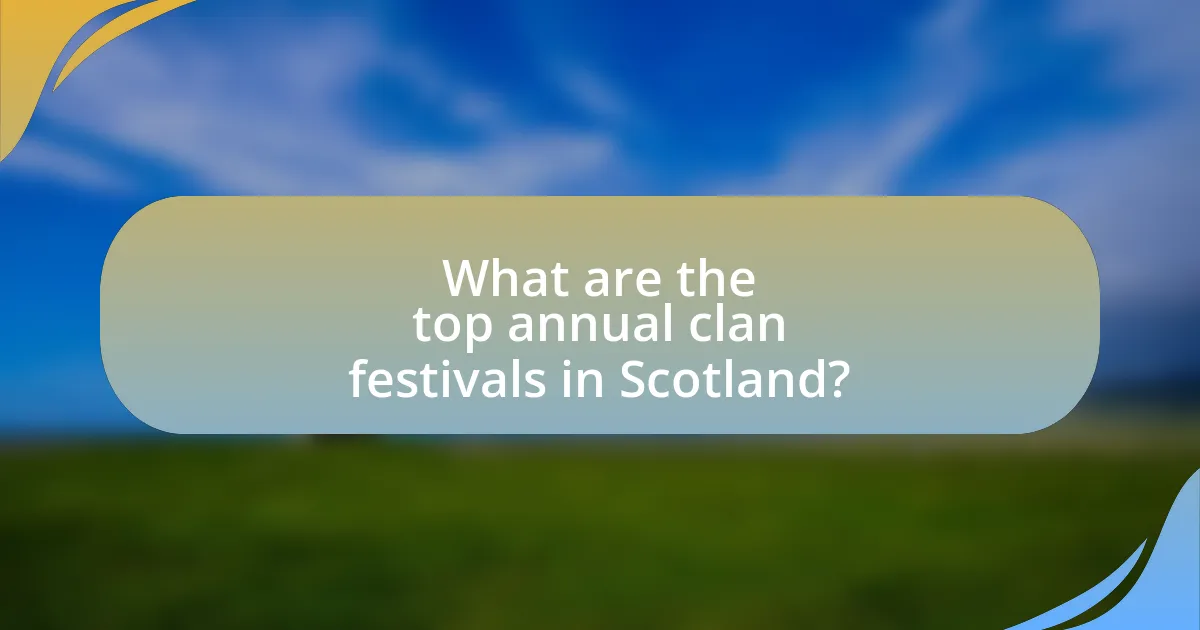
What are the top annual clan festivals in Scotland?
The top annual clan festivals in Scotland include the Clan Gathering at the Scottish Parliament, the Clan MacGregor Gathering, and the Clan Campbell Gathering. These festivals celebrate Scottish heritage, featuring traditional music, dance, and cultural displays. The Clan Gathering at the Scottish Parliament, held every year, showcases various clans and their histories, while the Clan MacGregor Gathering, which occurs every five years, emphasizes the clan’s rich history and traditions. The Clan Campbell Gathering, also held every five years, brings together members of the Campbell clan for a weekend of festivities, including games and competitions. These events are significant for preserving and promoting Scottish clan culture.
Which festivals are considered the most significant?
The most significant festivals celebrating Scottish clan heritage include the Royal Edinburgh Military Tattoo, the Highland Games, and the Clan Gathering. The Royal Edinburgh Military Tattoo showcases military performances against the backdrop of Edinburgh Castle, attracting thousands of visitors annually. The Highland Games, held in various locations, feature traditional Scottish sports, music, and dance, emphasizing clan pride and community. The Clan Gathering, often organized by specific clans, serves as a reunion for clan members and promotes cultural heritage through various activities. These festivals are vital for preserving and promoting Scottish traditions and clan identities.
What unique features does the Clan Gathering in Edinburgh offer?
The Clan Gathering in Edinburgh offers unique features such as the opportunity for clans to showcase their heritage through traditional music, dance, and storytelling. This event includes a grand parade of clans, where participants wear traditional Scottish attire, and engage in various competitions, including tug-of-war and athletic events, which highlight Scotland’s cultural history. Additionally, the gathering serves as a platform for clan societies to connect with members and share genealogical resources, fostering a sense of community among attendees.
How does the Braemar Gathering showcase Scottish traditions?
The Braemar Gathering showcases Scottish traditions through its celebration of Highland games, traditional music, and cultural displays. This annual event features competitions in traditional sports such as caber tossing and tug of war, which have historical roots in Scottish clan culture. Additionally, the gathering includes performances by pipe bands and displays of Scottish dancing, reinforcing the importance of music and dance in Scottish heritage. The event also serves as a platform for clans to gather, fostering a sense of community and continuity of Scottish identity.
What activities can attendees expect at these festivals?
Attendees at Scottish clan festivals can expect a variety of activities that celebrate heritage and culture. These activities typically include traditional music performances featuring bagpipes and folk bands, showcasing the rich musical history of Scotland. Additionally, attendees can participate in clan gatherings, where they can connect with their ancestral roots and meet fellow clan members.
Cultural demonstrations such as Highland games, which include events like caber tossing and tug-of-war, provide an engaging way to experience Scottish athletic traditions. Furthermore, many festivals offer workshops on traditional crafts, such as tartan weaving and pottery, allowing participants to learn and appreciate these skills firsthand.
Food stalls featuring traditional Scottish cuisine, including haggis and shortbread, enhance the cultural experience. Overall, these festivals provide a comprehensive celebration of Scottish clan heritage through diverse and interactive activities.
What types of competitions are held at clan festivals?
Clan festivals typically feature competitions such as tug-of-war, caber tossing, and Highland games events. These competitions celebrate traditional Scottish culture and heritage, showcasing strength, skill, and teamwork. For instance, caber tossing involves competitors lifting and flipping a tall log, which is a hallmark of Highland games, while tug-of-war emphasizes teamwork and physical strength among clan members. These events not only entertain but also foster community spirit and pride in Scottish heritage.
How do music and dance play a role in the festivities?
Music and dance are central to the festivities of Scottish clan festivals, serving as vital expressions of cultural identity and community spirit. Traditional Scottish music, characterized by instruments such as the bagpipes and fiddles, creates an atmosphere that celebrates heritage and fosters a sense of belonging among participants. Dance, particularly forms like ceilidh dancing, encourages communal participation and reinforces social bonds, allowing attendees to engage actively in the celebration. Historical evidence shows that these elements have been integral to Scottish gatherings for centuries, with documented instances of music and dance at clan events dating back to the 15th century, highlighting their enduring significance in preserving and promoting Scottish culture.
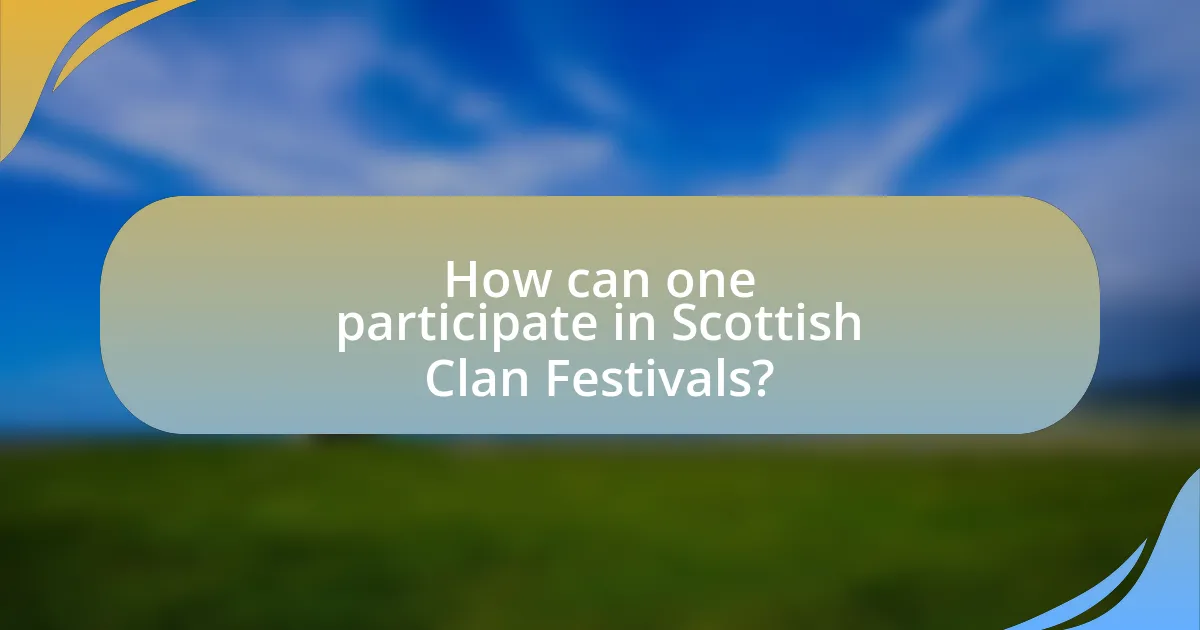
How can one participate in Scottish Clan Festivals?
To participate in Scottish Clan Festivals, individuals can attend events organized by various clans, which often include parades, games, and cultural exhibitions. These festivals typically take place annually in locations such as Edinburgh, Inverness, and other regions with strong clan ties. Participation can involve registering for events, joining clan societies, or volunteering during the festival. Many festivals also welcome visitors to engage in traditional activities, such as dancing, music, and storytelling, which are integral to celebrating Scottish heritage.
What are the best ways to prepare for attending a clan festival?
To prepare for attending a clan festival, individuals should research the specific festival’s schedule, activities, and cultural significance. Understanding the festival’s events, such as traditional games, music performances, and clan gatherings, allows attendees to plan their participation effectively. Additionally, it is essential to dress appropriately in clan colors or tartan to honor heritage, as many festivals encourage traditional attire. Engaging with clan representatives or local historians can provide deeper insights into the festival’s history and customs, enhancing the overall experience. Furthermore, arranging accommodations and transportation in advance ensures a smooth visit, as popular festivals may attract large crowds, making last-minute arrangements challenging.
What should visitors know about clan attire and customs?
Visitors should know that clan attire, particularly kilts, is a significant aspect of Scottish clan customs, symbolizing heritage and identity. Kilts are traditionally made from tartan, which represents specific clans, and wearing them during clan gatherings or festivals is a way to honor one’s ancestry. Additionally, customs such as the ceremonial wearing of clan badges, the use of specific colors, and the participation in traditional dances and music are integral to clan events. These practices not only celebrate individual clan histories but also foster a sense of community among attendees, reinforcing the cultural significance of clan identity in Scotland.
How can attendees engage with clan representatives at the festivals?
Attendees can engage with clan representatives at the festivals by participating in clan-specific activities, attending informational sessions, and visiting clan tents. These activities often include storytelling, traditional music performances, and interactive workshops that allow attendees to learn about clan history and culture directly from representatives. Additionally, clan tents serve as hubs for discussions, where attendees can ask questions and share experiences, fostering a deeper connection with the clan’s heritage.
What tips can enhance the festival experience?
To enhance the festival experience, attendees should plan their visit by researching the festival schedule and activities in advance. This preparation allows individuals to prioritize events of interest, ensuring they do not miss key performances or cultural displays. Additionally, arriving early can provide better access to seating and reduce stress. Engaging with local vendors and participating in workshops can deepen the understanding of Scottish clan heritage, making the experience more immersive. Staying hydrated and wearing comfortable clothing are practical tips that contribute to overall enjoyment, as festivals often involve extensive walking and outdoor activities.
How can visitors make the most of their time at clan festivals?
Visitors can make the most of their time at clan festivals by actively participating in various activities and engaging with the cultural heritage presented. Attending traditional events such as clan gatherings, storytelling sessions, and dance performances allows visitors to immerse themselves in the rich history and customs of Scottish clans. Additionally, exploring vendor stalls that offer local crafts, food, and clan memorabilia enhances the experience by providing tangible connections to the culture. Engaging with clan representatives and participating in workshops can also deepen understanding and appreciation of clan traditions. These activities not only enrich the visitor experience but also foster a sense of community and belonging among attendees.
What resources are available for learning about clan history before attending?
To learn about clan history before attending festivals, individuals can utilize several resources. Key resources include clan websites, which often provide detailed genealogies, historical accounts, and cultural information specific to each clan. Additionally, books such as “The Clans of Scotland” by Frank Adam offer comprehensive insights into clan histories and their significance. Academic journals and articles, like those found in the Scottish Historical Review, also present researched information on clan dynamics and heritage. Furthermore, local libraries and historical societies in Scotland may have archives and records that detail clan histories, enhancing understanding before participation in clan festivals.
